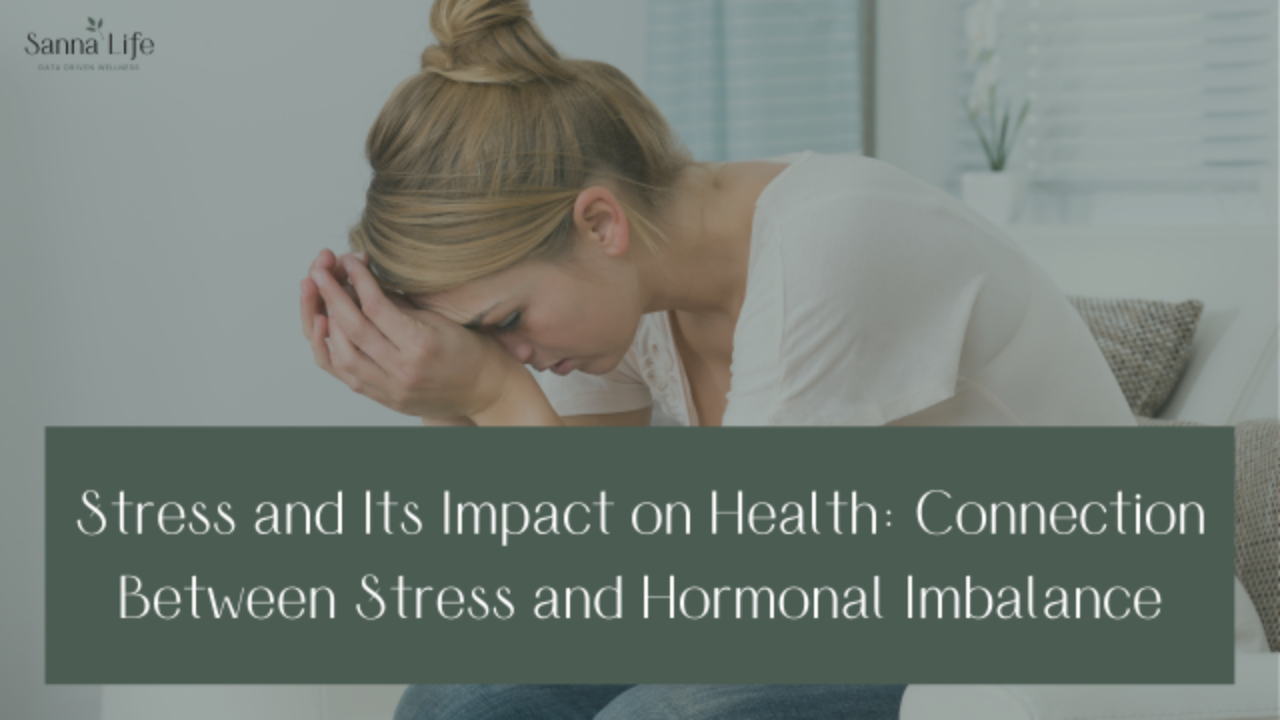Stress and Its Impact on Health: Connection Between Stress and Hormonal Imbalance
May 13, 2025
Stress is a natural part of life. Many of us deal with it regularly. Most people do not realize just how much stress can impact their overall health, both psychologically and physically. Stress is often viewed as a psychological problem, but its impact goes beyond the brain. It can affect the entire body, hormone balance, immune system, and overall health.
Stress has become a regular part of life for many people. Between working a job (sometimes even two), managing everyday life, school, and built-in challenges of life, there always seems to be something to stress about. It is normal to experience stress in life. As much as we want to deny it, stress is a normal defense reaction to a multitude of environments. At the same time, we need to be aware that stress can produce negative consequences, and when stress becomes chronic, the damage can be irreversible. In this blog, we will discuss in detail stress and its impact on health.
How Stress Affects Hormones

Hormones are the body's chemical messengers that travel in your blood to regulate a variety of critical functions in your body, including sleep, energy levels, moods, digestion, reproduction, and appetite. When there is constant or chronic stress, your body produces huge amounts of cortisol (the main stress hormone) in response to the stressor. Cortisol is necessary for short-term "fight or flight" responses, but excessive amounts of cortisol over long periods can disturb the balance of many other important hormones, leading to mental and physical health problems. Below is a rundown of how stress alters some of the major hormones in your body:
- Thyroid Hormones
Stress can take a considerable toll on your thyroid function. As you may have realized, your body enters a state of stress, resulting in your body producing large amounts of cortisol. This hormone has now become well known for slowing your thyroid function (the hormone that is responsible for your metabolism). As a result, all of a sudden you feel tired all of the time, are gaining weight easily, feel cold regularly, and have difficulty concentrating. Your brain feels foggy, and even daily tasks can feel unbearable. If that wasn't bad enough, even though you are likely eating the same foods, your body is now storing fat quicker (cortisol) and burning less energy (less functional thyroid) in the case of hypothyroidism.
- Reproductive Hormones
When the body perceives stress and cortisol is high, the body will prioritise the stress response over making our sex hormones ( Progesterone) which has a negative effect on reproduction.
Stress can cause a major imbalance in your reproductive hormones. When cortisol (the stress hormone) is high, your body prioritizes dealing with stress over producing essential sex hormones like progesterone. In women, this can lead to irregular cycles, mood swings, heightened PMS symptoms, and even missed periods. For many women, fertility struggles may be linked to unrecognized stress. In men, chronic stress can reduce testosterone levels, causing fatigue, low libido, reduced energy, and muscle loss. This hormonal imbalance affects not only your physical health but also your confidence and emotional well-being.
- Insulin
There is also a huge knock on effect between insulin onto your reproductive hormones. Insulin increases the stress hormones adrenaline and cortisol which in turn deplete the body of progesterone ( the calming hormone and the ) and increases the production of oestrogen, creating hormonal imbalance.
- Melatonin
Melatonin is the hormone that regulates your sleep cycle. When your stress goes up, your melatonin goes down. This will make it more difficult to fall asleep or stay asleep at night. You may be tossing and turning in your bed, getting up and down several times, or just restless all night long. You may even wake up fatigued, even after you were in bed all night. Poor sleep can affect your mood, your focus, energy levels, and even your immune system. And since lack of sleep is stressful in its own right, this combination can lead to a cycle that can feel difficult to escape.
Psychological and Emotional Impact of Stress

Stress doesn’t just harm your body. It also affects the way you think, feel, and react to the world. Over time, stress starts to change the way your brain works. Stress throws hormones and brain chemicals out of balance, leading to emotional and mental issues that are typically difficult to comprehend or manage.
- Weakened Memory and Concentration
Chronic stress reduces your brain's ability to remember and focus. The cortisol hormone affects an area of the brain known as the hippocampus, which helps in learning and remembering. Therefore, people suffering from chronic stress forget important things, lose focus quickly, and struggle to make good judgments. Simple tasks are overwhelming when your mind is tired and confused.
- Negative Thinking Patterns
Stress makes the mind more susceptible to fear and doubt. This results in intrusive negative thoughts that are hard to manage. You may think you are always going to experience something bad. This becomes a routine with time. You may start to expect failure, become powerless, or become too hard on yourself. Such thought patterns may lead to more stress and burden your life unnecessarily.
- Increased Anxiety and Panic Feelings
If your body stays in survival mode for too long, it can trigger anxiety. Your heart will race, your chest will tighten, or your hands will become unnecessarily sweaty. The effects might appear out of nowhere, and you will experience panic or fear for no apparent reason. Slowly, the anxiety turns into a pervasive feeling that affects your confidence and tranquility.
- Mood Swings and Irritability
Stress can unbalance your emotions. One moment you are fine, and then your emotions just flip. You get angry suddenly, you are upset, or you are frustrated. This happens because of stress hormones on your mood-controlling systems. Everything irritates you. You cannot seem to argue less with other people or even feel guilty about what you react to. These mood swings can affect your relationships and your capacity to stay calm under pressure.
- Emotional Numbness or Detachment
In other cases, stress does not lead to overreaction. Instead, it leads to emotional shutdown. You may feel numb within or disconnected from the world. Things that used to make you happy no longer matter. Numbness is a sign that your mind is trying to protect itself from stress, but it also leads to a disconnection between you and the world around you. In the long run, it can lead to loneliness or even depression.
Physical Symptoms of Hormonal Imbalance Caused by Stress
A lot of people don’t recognize that the physical and emotional changes they are experiencing are, in fact, hormonal imbalance symptoms triggered by stress. Let’s examine each of these symptoms and how stress is directly responsible:
- Constant Tiredness
Stress increases the amount of cortisol in your body. When cortisol levels stay high for an extended period of time, your adrenal glands tire. This leads to adrenal fatigue—a condition when you're tired even after you've had enough rest. You might wake up tired, find it hard to focus during the day, or always feel run down on energy.
- Weight Gain or Weight Loss
Stress affects your metabolism. You may eat more when stressed and put on weight, especially around the stomach. Others lose appetite and lose weight. Cortisol also tells your body to gain fat, especially if you have poor sleep or an irregular diet. This becomes a cycle that makes the body gain weight, which leads to stress again.
- Mood Swings
Hormones like estrogen, progesterone, and cortisol also affect your mood directly. You're fine for a moment and then suddenly upset or sad if you're subjected to stress, and it messes with the hormones. Your social life is disrupted, as well as your routine.
- Anxiety or Depression
Chronic stress lowers serotonin and dopamine levels, the "happiness hormones," and increases cortisol, which can make you feel anxious, nervous, or depressed. You may feel overwhelmed by small issues, worry excessively, or feel hopeless without cause.
- Irregular Periods
In women, stress is also one of the major reasons for irregular periods. It disrupts the estrogen-progesterone balance and may lead to missed or delayed periods, cramping, or excessive bleeding. Even PCOS can be caused by it or make its symptoms worse in some cases.
- Trouble Sleeping
Stress increases cortisol, which keeps your mind and body awake—even at night. That's why stressed people tend to wake up in the middle of the night, overthinking, or wake up frequently. Poor sleep further enhances hormonal imbalance, creating a vicious cycle.
- Hair Loss
Hormonal shifts brought on by stress can push your hair follicles into a "resting phase," causing noticeable hair loss. This is referred to as telogen effluvium, and it will usually happen a few weeks after the stressful event or time. It may cause hair thinning or bald patches in severe cases.
- Skin Problems
Stress and hormonal fluctuations can lead to acne outbursts, dryness, or sudden dullness. Cortisol promotes oil production in your skin, which can clog pores and lead to pimples. Stress also decelerates the capability of your skin to repair itself, making it look tired and old.
- Poor Digestion
Stress affects your gut-brain axis. Stress-induced hormonal imbalances can lead to slow digestion, bloating, constipation, or even acidity. You may always feel stuffed or have cramps with no apparent cause.
Link Between Stress and Hormonal Imbalance

Chronic stress has many effects, but one of the most significant is its potential disruption of the hormonal balance in your body. Hormones are chemical messengers that regulate almost every aspect of your health, including metabolism, mood, reproduction, and immunity. When a stressor continues over time, cortisol (the primary hormone related to stress) is secreted in large amounts continually. Cortisol can create hormonal dysfunction and imbalances with other hormones in the body if there is a continual release of cortisol.
- Cortisol and Hormonal Disruption
Cortisol is often called the "stress hormone" due to its involvement in the body's response to stress. Cortisol can be helpful in the short term, but prolonged stress keeps cortisol levels high for too long and results in an imbalance of other hormones. One of the main impacts of this hormonal imbalance is on reproductive hormones (like estrogen and progesterone in women and testosterone in men).
- Stress and Hormonal Imbalance in Women
Cortisol doesn’t cause PCOS directly, PCOS is primarily driven by insulin resistance, androgen excess, and ovulatory dysfunction. However, chronic stress can worsen PCOS symptoms, especially if it raises insulin and androgens.
Also, high cortisol can mimic or worsen adrenal-type PCOS, where DHEA-S (an adrenal androgen) is elevated.
- Stress and Hormonal Imbalance in Men
Men deal with hormonal fluctuations as well, and one of the areas that stress can affect is how long cortisol levels stay elevated for. The most significant impact of stress on the male body could be its impact on testosterone, a hormone that impacts energy, muscle mass, and mood. Lower levels of testosterone can lead to fatigue, mood swings, lack of clarity, poor libido, and reduced physical performance. Chronic stress can also affect the thyroid gland, leading to weight gain, tiredness, and issues with metabolic processes.
- Stress and Thyroid Function
The thyroid is a small gland found in the neck and is vital for maintaining a person's metabolism, energy, and growth. Stress can impact thyroid function by promoting increased cortisol levels, which can inhibit the production of thyroid hormones. The resulting imbalance of the thyroid hormones can lead to symptoms of fatigue, weight changes, and difficulty focusing. In the extreme, chronic stress from severe circumstances may also cause thyroid conditions, including hypothyroidism.
- Why Stress is Worse During perimenopause
Due to the fact that progesterone is lowered first ( the medical community mainly focuses on oestrogen) but progesterone deficiency causes major symptoms in the female body and we lose mental resilience because progesterone is naturally our calming hormone that influences our mood, sleep, boosts energy, it nourishes hair and clears skin, it also lightens periods and reduces inflammation and modulates immune function, keeps our bones strong builds muscle and regulates insulin.
How Our Holistic Approach Helps You Heal Hormonal Imbalances Caused by Stress

When stress takes over, your body goes into survival mode, and that has an impact on everything from your mood and energy to hormonal balance and immune system. We plan to work with your body to recover and thrive again, step by step.
- Personalized Nutritional Therapy
We don't think one-size-fits-all diets exist. Rather, we examine what your body needs with a comprehensive nutritional evaluation. Proper nutrients can regulate cortisol, balance blood sugar, and enhance your thyroid, all of which are necessary for healthy hormone balance.
- Nervous System Reset
Stress makes your nervous system go into high alert. We employ subtle methods to swap your body from "fight-or-flight" status into a healthier, more relaxing state. That's the building block for recovery of hormonal equilibrium, sleep quality, and relief from anxiety.
- Functional Testing & Deep Insights
You're entitled to better than guesswork. We employ data-driven tools to identify the underlying cause of your symptoms, be it cortisol imbalance ( known as adrenal fatigue), compromised gut health, or silent inflammation. This enables us to create a plan that acts faster and better.
- Long-Term Tools, Not Quick Fixes
You will discover how to tune into your body's signal, stay stress-free, and achieve hormonal balance in the long run so you don't just feel better, you become better.
Final Thoughts
Stress is more than a feeling; it is a physical state that can influence nearly every aspect of your well-being. From hormonal imbalance to compromised immune system and emotional difficulties, the effect of stress is profound. Knowing the relationship of stress to health is the beginning to gaining control of your health.
If you are feeling the physical or emotional symptoms of stress, it is wise to deal with it before it creates more harmful health conditions. Knowing what causes you stress, learning to manage stress through various techniques, and getting professional intervention when needed can really enhance your life quality.
Stay connected with news and updates!
Join our mailing list to receive the latest news and updates from our team.
We hate SPAM. We will never sell your information, for any reason.




